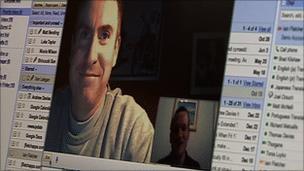Snow business: How technology helps firms beat weather
- Published
How businesses are using cloud computing and other technology to deal with bad weather
Snowstorms, floods, hurricanes, volcanic eruptions. When extreme weather strikes it can have a disastrous effect on business.
Weather-induced chaos disrupts transport and infrastructure resulting in lost productivity - costing global businesses billions of dollars.
But these scenarios have also presented an ideal opportunity for technologists to remind businesses that there are now the means to lessen the impact of bad weather.
"Businesses are incredibly impacted by weather events and if we look at 2009 there was more than $50bn (£32bn) of losses in the insurance industry alone," says Dr Matt Huddleston, principal consultant at the UK's Met Office.
"Vast amount of resources are lost because of bad weather so weather technology is hugely important to businesses because every single business, every location on the planet is exposed to the weather. By developing weather technology it enables businesses to manage their risks."
'Gives advantage'
People have attempted to predict the weather informally for millennia, and formally since at least the nineteenth century.
Weather forecasting is now big business. Meteorological data is collected from robotic buoys in the ocean, from ships, from satellite views and from thousands of volunteer climate observers.
Super computers and meteorologists then crunch that data to predict the weather.
But how important is a high-tech weather service to help businesses manage the impact of the weather and offset potential risks?

Recent frozen weather in the UK caused serious travel disruption
FedEx Express, one of the world's biggest delivery companies, employs an in-house team of 15 meteorologists to forecast the weather.
"FedEx has one of the best weather technology centres of any airline and it really does give us an advantage to make sure we can plan and have one of the most robust delivery systems in the business," says William Martin, managing director of the firm's UK operations.
"Our team of meteorologists in Memphis monitor the weather at all times so they can see weather patterns developing.
"But they can also see immediate risks to the business and they can make necessary adjustments immediately, like diverting flights and things like that."
Cloud computing
Gritit is a firm whose business is based around weather - gritting roads and car parks for clients ranging from hospitals and the police when temperatures plunge.
And it is another company that relies on tailored weather technology to run its business.
Managing director Alastair Kight says the firm is now leading the way in winter risk management, having switched to the relatively new technology offered by cloud computing.
When a firm uses cloud computing it does not build all IT infrastructure by itself. Instead, it rents storage, computing power or software services from other companies.
The services are accessed via the internet, which in network diagrams is shown as a cloud, hence the name.
"With more than 80,000 jobs already delivered this season in less than two months, there is no way that a system that wasn't akin to cloud computing would be able to cope," says Mr Kight.
At its operations centre, localised weather predications get imported into software that automatically works out locations that need gritting. On busy days, more than 1,000 jobs will be created.
"It saved us at least £250,000 in this current year in personnel who would otherwise be handling the data that the system handles," Mr Knight adds. "Now, it's just all just going on in the background."
Snowball fights
Cloud computing is not only helping businesses like Gritit.
Commuters who find themselves stuck at home because of travel disruption brought on by the weather are taking advantage of the technology too.

Firms such as Google offer ways to communicate with colleagues from afar
"I have had to work from home a lot more recently because of the weather and it's vital for me to have all the applications and data that I use in the office at home as well," says Iain Fletcher, who works for Google.
"What makes its easier for me to work from home is that all my data and applications are in the cloud and I can access them from any device in the house."
With a simple internet connection, Mr Fletcher stayed in contact with other colleagues via Google's video chat and also worked on content in real-time - using the iPad and his phone running Google's Android software - after being snowed in.
"The flexibility of working from home means that I don't panic if I can't get into the office because of the snow. I can get all my work done, stay on top of things and also enjoy the odd snowball fight with the wife!"
'Fantastic'
The global market for cloud computing technology will be worth more than $30bn in the next four years, according to a new report from Gartner, a technology research house.
And according Outsourcery, a specialist in providing such services for businesses, eradicating the need to go to an office means that work is "no longer somewhere you go but something you do".
"The fantastic thing about cloud computing is that people are typically struggling to the office to connect to business information and colleagues, but with cloud [computing]... you can connect to it anywhere in the world," says the firm's joint chief executive Piers Linney.
Outsourcery's intranet is designed so that staff, wherever they are, have access to video calls from either their computer or phones. "Virtual" meetings help them to stay in touch, too.
'Losing data'
However, while mobile and remote working tools may keep staff productive and safe from severe weather conditions, there are concerns about data security and backup provisions as more data is stored in a central location on the web.
An ever-increasing mobile workforce using the cloud means that securing data and information from virus attacks and hackers is now "much more difficult," according to Paul Wood, senior analyst at computer security firm Symantec Hosted Services.
And his other concern about cloud computing is about trust in the provider of the services.
"If you lose access to the internet - whether your internet goes down or if your internet service provider has a problem, then you lose access to your data as well," he says.
"With free services, there is often no support for when things go wrong, and that can significantly impact your business if you cut corners on your budget."
But despite the new security challenges cloud computing brings, technologists may have a strong case to argue that cloud does lessen some of the impact bad weather has on business - forecasting a bright, sunny future.